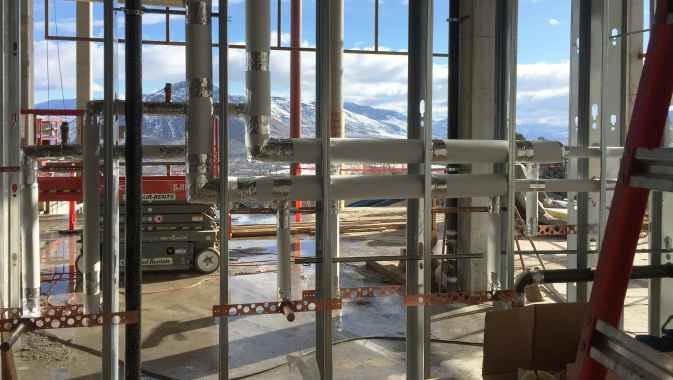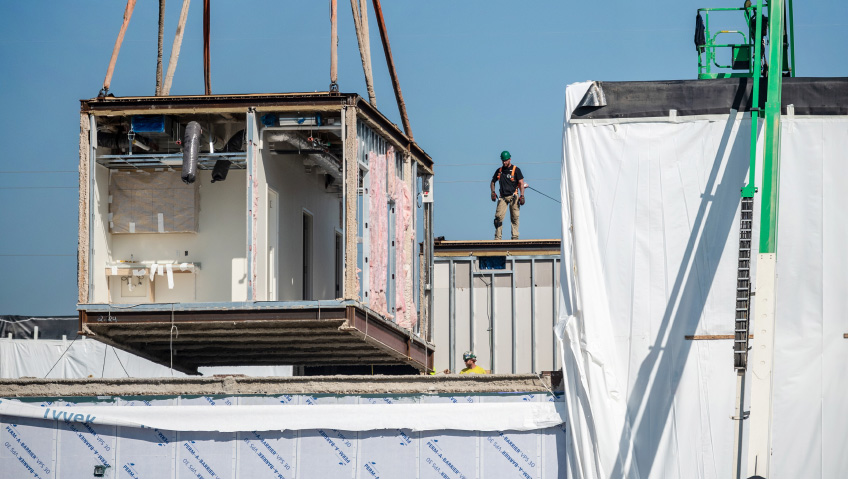KAEFER Canada is the Canadian arm of a global leader in the field of insulation and related services. Originally founded in Germany in 1918, KAEFER has built a reputation for delivering quality services worldwide and traces its roots in the Canadian market back nearly seventy years.
The history of the company reaches back to Lower Saxony, Germany in the early years of the First World War. At the time, Carl Kaefer was making his living by selling peat moss and had found a fair amount of success in that venture. After a few years of learning about and working with peat, he realized that he could sell it as an insulation medium for industrial ships. By the end of the war, he decided it was time to go into business for himself, and in 1918 he did just that.
In the 1940s, the company had expanded from insulating ships to insulating industrial plants, and its propensity to grow has continued ever since. Today, after more than one hundred years in business, KAEFER is world-renowned as an innovator in the field of insulation.
KAEFER Canada specializes in industrial and commercial insulation with a focus on thermal and acoustic insulation, which is designed to limit the transfer of both heat and sound. Recently, the company has been working to expand the capabilities of its Canadian branch to include additional services such as scaffolding, painting, coating, and fireproofing. Outside of Canada, these services are already central to the company, so the expertise and experience are already developed.
“Our customers benefit from our reliability, experience, quality, global presence, and aggregated technology on a combined multiservice solution. That’s what we bring to the market in Canada. We hear the same from all of our sites, that we always bring more value to our customers in terms of tech and innovation,” says Chief Executive Officer Rafael Machado. He is a relatively new addition to the KAEFER Canada team, having come on board in September of 2020 after fourteen years working in several countries with the KAEFER group.
The company is made up of a small but efficient group of fifty specialists who work across more than ten sites, including a head office in St. Albert where it has a small prefabrication shop. It invests heavily in technology and has a competent team of expert engineers. A team of senior estimators and senior multidisciplinary project managers can manage both insulation and scaffolding. There are also business development experts, controllers, administrative staff, and a health, safety, environment, and quality (HSEQ) team.
KAEFER provides its services to a diverse collection of competitive markets. To distinguish itself, the company has invested a great deal of time and money into refining the overall effectiveness of its operation using lean site management methodology and digitization initiatives.
“We are investing hard in lean management and digitization to improve our management capacity and bring value to our customers. During COVID, this has become more and more important, because with people working from home, you need ways to inspect your site and know what’s going on even when you can’t be there. We’ve invested in digital solutions to manage the job remotely. KAEFER is in the vanguard of that,” says Machado. The company has been on what it calls its ‘lean journey’ for more than eight years, and it is now on a digital transformation journey as well.
KAEFER aims to be much more than a service provider. On any job site, the company’s goal is to build a deep knowledge of the specific needs of the project. This ensures that the team can apply their experience and expertise toward helping the customer meet intended targets. Once its team of specialists understands a client’s exact needs, they can engage not only the local team but also the company’s global personnel resources toward finding the perfect solution to the given problem.
As an ISO-compliant company, KAEFER operates with the highest quality standards. As a result, it has built a strong and solid reputation across all sectors in all the countries it operates within.
Over the last two years, the company has made some substantial changes to how it is approaching the Canadian market. First, management made the strategic decision to concentrate its operations in Western Canada, closing all of its branches on the Atlantic side to focus on providing its services to customers in Alberta, British Columbia, and Saskatchewan. Currently, the company is expanding investment into multiple services beyond insulation into scaffolding, painting, coating, and fireproofing.
Further, the company is making the necessary preparations to provide support to the liquefied natural gas (LNG) market in Canada. KAEFER has a solid background in the LNG field, with a long list of successful projects throughout Europe, Australia, Asia, and the United States. An Australian organization under the KAEFER umbrella specializes in LNG projects and is being called on to impart its expertise to its Canadian counterparts in this sector.
This new LNG focus may enable the company to expand into Kitimat, British Columbia. “Expansion into Kitimat is a natural path as we are looking to support the LNG business in the region. We want to expand and support other clients in that region as well. We expect, depending on the volume of business, we might even be opening a new branch there,” says Machado.
With a long history of working on LNG projects throughout the world, KAEFER can apply its international resources toward building a leading Canadian LNG solution. That level of expertise sets it apart from any other company in that sector in Canada.
LNG plants are made up of many modular components, and typically those components are built in other countries and then shipped to North America where they are first insulated and then installed. KAEFER has developed a system where all the pipes can be pre-insulated and installed in the module at the manufacturing plant so that, when it arrives in Canada, the receiving team can focus solely on installation.
This maximizes more than just the speed and efficiency of this process. Since the product is constructed in a controlled shop environment, there is much less risk of water ingress and moisture-related damage. This greatly improves the quality of the insulation and the component, and it is a major differentiator for the company, as it is a technology exclusive to KAEFER.
Several issues arise when equipment is not properly insulated, or when it corrodes underneath the insulation. Pipes and equipment surfaces can get hot enough to cause burns if a worker gets too close or comes in contact with it, plus you lose your process integrity and you pollute the environment.
KAEFER offers an energy auditing service that enables customers to recognize how they can increase the sustainability of their operation, advance safety in their facilities, and reduce their carbon footprint. An energy audit is between 80 and 100 pages, and the company has performed more than 200 of them worldwide. Often plant operators are surprised to find out how great the energy and CO2 saving potentials are and how short the payback time is (usually less than two years).
During an energy audit, KAEFER thermographers will visit a client’s site to take thermographic pictures and measurements. KAEFER will assess the facility and provide a report with actionable advice on how to properly insulate their equipment. It includes not only the exact amounts and types of insulation they require but also an estimation of how much it will cost and how quickly it will pay off.
One of the most critical issues around insulation is a phenomenon called Corrosion Under Insulation (CUI). Due to the insulation itself and the cladding around it, you often cannot see when a pipe is corroding underneath. KAEFER offers a CUI health check service. During the check, the company will assess a number of key aspects of a business that have a direct correlation to the monitoring and handling, as well as perform risk mitigation of this problem. In order to give advice for improvement, KAEFER will analyze the customer’s internal processes, how technically competent their organization is, and how the company handles data when it finds anomalies.
“You try to find out why it’s happening, why it’s happening so often, why it’s happening in this area rather than another, and what do you do to prevent it in the future? So, we compare the inherent risks you have with the capabilities of your organization,” says Thomas-Peter Wilk, KAEFER Chief Technical Officer and Head of Corporate Innovation and Technical Excellence from the KAEFER Group headquartered in Germany. This assessment will help a company know how best to detect and handle CUI.
The COVID-19 pandemic has had a devastating effect on KAEFER Canada. The company is closely tied to the oil and gas industry, as a significant portion of its customers are either in or are connected to that space. In 2020, many of its projects were postponed or cancelled entirely and earnings dropped significantly. Luckily, 2021 has shown more promise with an increase of nearly thirty percent compared to 2019 but still far from the levels it was at before the pandemic.
As the market grows more competitive, companies will need to seek novel, technology-driven solutions to increase efficiency and reduce costs, and KAEFER’s commitment to providing competitive, high-quality industrial services continues to push it to the front of Canadian industries.






